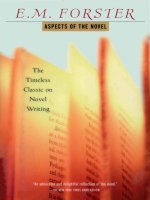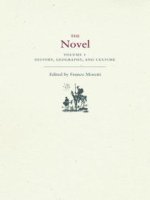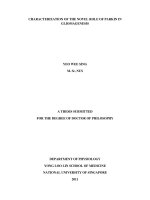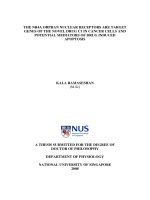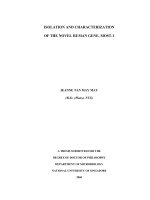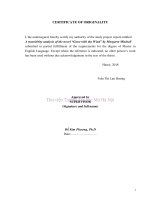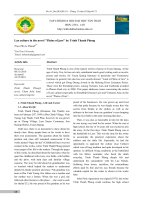the novel aletta
Bạn đang xem bản rút gọn của tài liệu. Xem và tải ngay bản đầy đủ của tài liệu tại đây (1.03 MB, 267 trang )
TheProjectGutenbergEBookofAletta,byBertramMitford
ThiseBookisfortheuseofanyoneanywhereatnocostandwith
almostnorestrictionswhatsoever.Youmaycopyit,giveitawayor
re-useitunderthetermsoftheProjectGutenbergLicenseincluded
withthiseBookoronlineatwww.gutenberg.org
Title:Aletta
ATaleoftheBoerInvasion
Author:BertramMitford
ReleaseDate:May28,2010[EBook#32565]
Language:English
***STARTOFTHISPROJECTGUTENBERGEBOOKALETTA***
ProducedbyNickHodsonofLondon,England
BertramMitford
"Aletta"
ChapterOne.
BookI—TheTransvaalEmissary.
ThedelegatefromPretoriawasinfullblast.
Thelongroomwaspackedfull—fullofmaleBoersofallages:thatis
to say, from those in earliest manhood to the white-bearded greatgrandfathersofthecommunity—Boersofeverytype,Boershairy,Boers
shaven,moleskin-cladandcollarlessBoers,andBoersgotupwithnear
approach to European neatness; Boers small, dark, and wiry, still, after
generations,preservingtheoutwardcharacteristicsoftheirHuguenotand
French ancestry; Boers tall, large-limbed, fair, of Saxon aspect and
descent.
What sitting accommodation the room held was absorbed by the
olderofthosepresent,forthepatriarchaltraditionisverystrongamong
that old-world and conservative race. The residue stood in a closely
packedmass,literallyhangingonthewordsoftheorator.
The latter was a tall, elderly man, all fire and energy both as to
speech and words. His face, strong and bronzed and lined, was of the
Romantype,andthebrownofhisshortbeardwasjustbeginningtoshow
threadsofgrey.Standingthereinhissuitofblackbroadcloth,hissinewy
figure seemed hardly in keeping with such attire. It seemed to demand
the easier and more picturesque hunting costume of the veldt. Andries
Erasmus Botma was his name, and he ranked among his fellowcountrymen as a “Patriot,” second to none as deserving their closest
attentionanddeepestveneration.
Onthetablebeforehimstoodtwolightedcandles,throwingoutthe
linesofhisstrong,ruggedcountenance,andbetweenthemaponderous
Dutch Bible, upon the closed cover of which one great hand constantly
rested. On one side of him sat “Mynheer,” as the local predikant, or
minister,iscommonlyknownamonghisflock;ontheotherJanMarthinus
Grobbelaar—or Swaart Jan, as he was popularly termed—the owner of
the farm on which the gathering was taking place. The minister was a
puffy,consequential-lookingman,withlong,shavenupperlipandalight
beardcutafterthepatternofthatwornbytheworld-famedPresident,a
white tie, reaching nearly from shoulder to shoulder, standing
aggressively forth from the clerical black. The farmer was a wizened
individual, with a pronounced stoop, and, at first sight, of retiring
temperament;butalongnoseanddeep-seteyes,togetherwithtwoteeth
projecting tusk-like from each corner of the mouth out upon a lank,
grizzled beard, imparted to him an utterly knowing and foxy aspect, in
keepingwiththereputation“SwaartJan”actuallyheldamonghiskinsfolk
andacquaintance.
ThedelegatefromPretoriawasinfullblast.Themeeting,whichhad
opened with long prayer by the predikant and a long speech of
introduction and welcome from Swaart Jan Grobbelaar, was now just
beginningtobecomeofintenseinterest—tothemeetingitself.Beginning
far back, with the insurrection under Adrian van Jaarsveldt and the
capitulation of the Cape by General Janssens, the orator had hitherto
been rather academical. Even the emancipation of the slaves, with its
wholly farcical system of compensation, did not appeal over much to a
younger generation, to whom it was all ancient history of rather too
ancientdate.ButwhenhecametotheSlagter’sNektragedy,hehadgot
his finger on a chord that would never cease to vibrate. The tense
attitudeofhislistenerswasthatofonemind,ofoneunderstanding.
“Brothers,”hewenton.“Brothers—andsons—formanyareheretonightwhoarethemenofthefuture—themenoftheverynearfuture—to
whom the one long life-struggle of their fathers in days of old is but a
name; to whom, however, the righting of the wrongs of their fathers is
bequeathed; to whom life—yea, even life itself, has been given and
allowedbytheLordabovethattheymaycarryoutthesolemnbequestof
righteousvengeancewhichtheirfathershavehandeddowntothem;that
theymayhaveeverbeforethem,everintheirthoughts,thedeliverance
of this their dear land, their splendid fatherland, from the hated English
yoke.Youthen—youyoungermenespecially—standupdaybydayand
bless God for the noble privilege which is yours, the privilege of the
patriot,ofthemanwhosacrificesall,worldlypossessions,evenlifeitself,
forthesakeofhisbelovedfatherland.NotmanydayssinceIstoodupon
thatspot,thatholyground,wherefiveofyourfatherswerecruellydone
todeathfornoothercrimethanrepudiatingtheruleofabloody-minded
king,anEnglishkingwhowasnottheirking,whosesovereigntytheyhad
never owned. There they were hung up to the infamous gallows where
they died the most ignominious of deaths, with every circumstance of
barbarity which could have been practised by the savage heathen
againstwhomtheyhaveeverstriven.StandinguponthatspotIcouldsee
the whole of it again. I could see those five men hauled beneath the
Englishgallows-tree,Icouldseethebraveandnoblefortitudewherewith
they went to their death. I could see the weeping crowd of their fellowcountrymen—of Our fellow-countrymen—and women—gathered to
witness their sufferings. And the five patriots—the five martyrs—were
dragged up by ropes to their doom. But, brothers, God intervened.
Heaven intervened. Even as the lions’ mouths were shut to Daniel—as
the fiery furnace kindled by the idolatrous king passed over the three
servants of God unhurt—even so Heaven intervened to render the
slaughter instruments of the cruel English king of no effect. The
apparatusofdeathgaveway,andthefivepatriotmartyrsfelltotheearth
unharmed.Whatthen?Whatthen,sonsanddescendantsofthosegreat
ones? Did the English recognise the hand of God? Did they recognise
that even their puny mockery of justice had to bow before the
manifestation of His will? They did not. In the face of the tears and
supplications and bitter grief of those who beheld; of those in whose
veins ran the blood of the martyred men, those five patriots were once
more put through the bitterness of death. This time Heaven did not
intervene. And why? In order that the death agonies of those tortured
patriotsshouldbeheldinremembrance;thattheyshouldbeeverbefore
theeyesoftheirdescendantsasanearnestofthedeathagoniesofthe
hatedandhatefulracewhichwastheiroppressorandisours.Brothers,I
stood upon that ground, that very spot, that holy ground, and I prayed
and gained strength that I might fulfil the purpose for which I am here.
Slagter’sNek!Theinfamousnamewhichwasgiventothatholyspothas
gone down to generations in its infamy, and ever will. Is there here a
Bezuidenhout, is there a Meyer, is there a Faber, is there a Snyman—
yea,andIcouldnameascoreofothers,ahundredothers,athousand
others—in the veins of whom runs the blood of the patriot martyrs? Let
them not forget the English butchery of Slagter’s Nek; then, when their
riflesarepointingstraight,lettheirwatchwordbe‘Slagter’sNek’!”
The speaker paused. Utterly carried away by his own feeling; his
wholeframewasinaquiver.Hiseyeswereflashing,andthesinewsof
his great hand resting upon the holy volume leapt out into knots. The
predikant, seated at his right, poured out a glass of water from an
earthenware carafe on the table, and thrust it into his hand, and he
swallowedthecontentsaswithaneffort,andinchokinggulps.Theeffect
upontheaudiencewasmarvellous.Thoroughlyoverawed,itsfeelingwas
expressedbyexclamationsdeepratherthanloud,andseveraloftheold
menpresentuncovered—forallworetheirhatsexcepttheoratorhimself
—and mumbled a fervid prayer. The fact that the historical tragedy had
been enacted eighty-three years previously was quite lost to view. It
might have taken place yesterday for the effect the recalling of it
produceduponthegathering.
The orator proceeded. He drew vivid pictures of the exodus of the
original Dutch settlers, sacrificing all to be free from the hated English
rule; of their intrepid and simple and God-fearing lives; of their daily
hardshipsandtoil;oftheirperilatthehandsoffierceandwarliketribes;
andwhilesettingforththeirenduranceandheroism,heneverwandered
farfromthemainpoint,thetextofhiswholediscourse—viz.howallthat
theirfathers,theoldVoortrekkers,hadtoendurewastheoutcomeofthe
oppressive rapacity of the English yoke. The myrmidons of England
would not leave them in peace and quietness even when they had
avenged the bloodshed and treachery of the Zulu despot, and had
reason to believe they had at last found the land of promise. Let them
look at Natal to-day. They, the Dutch, had bought it from Dingane, and
hadoccupiedit.ButtheEnglishhadcomeandhadseizeditfromthem,
hadrobbedthemofthefruitoftheirlaboursandoftheirtoil,andoftheir
outpoured blood. Let them look at the Transvaal of to-day. It was the
samethere.AhordeofEnglishbloodsuckershadpouredin,feveredby
the lust of gold, and still more and more, until the land was overrun by
them,asthelandofPharaohundertheplagueoflocusts.Andnotonly
that, but they had brought with them every life and soul destroying vice
which Satan and his hell-kingdom, Europe, could bring to bear to
contaminateandutterlycorruptaGod-fearingpeople.
The speaker went on to portray in lurid colours the vices of
Johannesburg,atown,heputit,purelyEnglish,whichthoseemissaries
of Satan had raised in their midst, contriving to put his finger, with
considerablenativeastuteness,onthedarkerspotsinseparablefromthe
advance of European methods and progress. He further drew contrasts
betweenthesimplelifeoftheyoungBoerofaquarterofacenturyback,
and the smart, educated, English-speaking, English-dressing, young
Boeruptodate,sovividandsolittletotheadvantageofthelatter,asto
causeseveraltherepresentperceptiblytowince.
“Brothers,”hewenton,“thetimeforpurgingawaytheseiniquitiesis
at hand. The eye of God is ever upon His people, and His wrath upon
theiroppressors.WhoturnedbackEngland’smight,nownineteenyears
ago?Whoturnedtheheartsofhertrainedanddrilledsoldiersintowater,
sothattheyfleddownthesidesofMajubalikehuntedbucksbeforeus—
beforeafewfarmers,whomtheydespisedassomanyignorantBoers?
Who smote them hip and thigh at Schuins Hoogte, and, indeed,
everywhere, down to the wicked attempt upon our land—our beloved
land,twoyearsago?Notthearmofourbraveburghers,butthearmof
the Lord. His arm brought us in triumph forth from the midst of our
enemies, and assured our peace and safety, and prosperity, in the land
whereinwedwell.AndasthemightoftheLordwasoverusthen,soisit
now. England may send out her ships, as she is doing—may pour her
soldiersintoourland,assheisdoing—maythreatenournoblePresident,
as she is doing—but what is that to us? When a nation, a God-fearing
nation, is in peril, God will raise up for that nation a deliverer. He has
raiseduponeforthisnation,andthenameofthatdelivererisStephanus
JohannesPaulusKruger.”
The roar of applause which went up at the mention of the great
name—heldinvenerationbyeveryDutchmanfromtheZambesitoCape
Agulhas—would have drowned the speaker’s voice, even if he had not
beensufficientlymasterofhiscrafttopauseinordertoallowthistouchto
haveitsfulleffect.Itwaslongbeforehecouldcontinue,andthenwithhis
righthandimpressivelylaidupontheholybookbeforehim,hethundered
forth a volley of passages therefrom, deftly applied so as to work upon
his audience, in such wise that many among it were by no means sure
that the President of the South African Republic was not actually
mentionedbynametherein,whileafewwerequitecertainhewas.The
wholeconstitutedastrangeandinstructivescene,fortheseenthusiasts
were, with the exception of the orator himself, all British subjects,
dwelling and prospering within a British colony, enjoying a responsible
governmentandequalrightsandrepresentationforall.
At length arose shouts for order and silence, and the speaker was
abletoresume:
“Brothers,Ihavehearditsaidthatyeareourbrethrennomore;that
we of the two Republics are of another nation, of a different blood; that
youonthissideoftheGrooteRivierhavebecomeEnglishnow—”
“Nee,nee!”burstfromtheaudience,inroaringnegative.
”—Thatyouwillnotraisearifleintheholycauseofyourbrethren,I
believeitnot.Ourwatchwordisnot‘AfricafortheTransvaal,’or‘Africafor
theFreeState,’but‘AfricafortheAfrikanders’.”
Againashoutofacclamationgreetedthewords.
“Brothers, I have been in England; I have seen her millions of
people,hersplendour,andherenormouswealth.ButIhaveseenmore.I
haveseenherweakness.Ihaveseenherlargecities,andtheirviceand
squalor. I have seen the frivolous luxury of her rich, and the hideous
miseryandwantanddesperationofherpoor;andItellyouthatforallher
outwardstrengthsheisaweaknation,arottennation,withallherbest
blood poisoned by disease, and her common blood turned to water by
foul air and hunger and drunkenness. And this is the nation which is
greedyforourland,israveningtostealthegoldwhichitcontains.”Then,
raising his powerful voice to thunder pitch: “Brothers, shall this go on?
Now, nay, it shall not, I tell you. All is in readiness. For years wehave
beeninreadiness,increasingourarmedmight,andnowwearereadyto
strike—tostrikewithaforceandterrorthatshallamazethewholeworld.
Be in readiness, too, brave burghers, patriots all; and to deliver this
message to you am I here to-night God does not will that this rotten,
frivolous,andenfeeblednationshallruleoveryouanylonger.Beready,
forthedayisathand.‘AfricafortheAfrikanders!’isourwatchword,and
theflagthatshallwaveoverthatUnitedAfricaisthis.”
Withthecelerityofaconjurerheproducedthefour-colouredflagof
theTransvaalRepublic,andwithonefiercejerkofthehandunfurlingit,
hewaveditabovehishead.Instantlyeveryhatwasoff,androundafter
roundofdeafeningcheeringhailedthesymbol.Then,ledbytheemissary
himself,thewholeassemblystruckupthe“Volkslied,”thenationalhymn
of the Transvaal, roaring it forth in a manner that left nothing to be
desiredinthewayoffervour,butmuchinthewayoftimeandtune,and
which must have impressed the numerous baboons infesting the crags
andkrantzesofthesurroundingWildschutsbergenwiththeinstinctthatit
washightimetoquitthatsectionofcountry,nevertoreturn.
When the singing and cheering had subsided the emissary invited
any of those present to express their opinions, but few cared to do so.
Oneortwooftheoldmengotup,buttheirremarksweremerequavering
comments—interspersed with pious aspirations—upon all that the
speakerhadsaid,andfellwoefullyflatafterthefieryperiodsandpower
ofeloquenceofthedelegatefromPretoria.Andthesecretofthatpower
lay in the fact that the man was so terribly in earnest. No timeserving,
self-seeking stump-agitator was Andries Botma. Every word he uttered
heimplicitlybelieved,andthatthewholeDutchraceinSouthAfricawere
under special Divine protection, and the Anglo-Saxon under the Divine
curse, he no more doubted than that the sky was above and the earth
beneath. Though a hopelessly fanatical patriot, he was essentially an
honestone,andthishishearersknew.
ThepredikanthavingmadeaspeechtohighHeaven,intheguiseof
a long prayer thoroughly in accordance with the prevailing sentiment of
themeeting,thelatterbrokeup.Afew,mostlytheoldermen,remained
behind, talking over the ideas they had just heard with all seriousness,
but most of them had crowded into another room where Vrouw
Grobbelaar, aided by her trio of fine and rather pretty daughters, was
dispensing coffee and other refreshment. These, too, were talking over
thesituation,butwithabreezyboisterousnesswhichwasabsentintheir
elders.
“It’s coming now, Tanta, it’s coming now,” cried one young fellow,
thrustinghiswaytothefront.Theoldladylookedathimacrossthetable.
“What is coming now?” she repeated shortly—a way she had with
thoseofthespeaker’sageandtype.
“Why,thewar,ofcourse.WearegoingtodrivetheEnglishoutofthe
country.ThePatriotsaysso.”
Theoldladysnorted.
“You look like driving anybody out of the country, Theunis Venter,
even the English. You’d be afraid to lie behind an antheap waiting to
shoot rooi-baatjes for fear of spoiling that pretty waistcoat of yours”—
lookinghimupanddowncontemptuously.“Andhistightriding-breeches
—oh!—oh!wouldn’ttheysplit?Andtherings!Andyetyoudon’tlooklike
anEnglishman,Theunis,noteveninyourgrandEnglishclothes.”
A roar of applause and derision from that section of her hearers
which had not enjoyed the advantage of a South African College
educationandaparentwithadvancedideasandgenerousbank-balance
greetedtheoldwoman’sscoffingwords.
“Ja,Ja,Theunis,thatisjustwhatthePatriotsaid,”theychorussed.
But the young fellow looked sulky—very much so. He was one of that
type of young Boer who no longer thinks it the mark of a man and a
patriottosleepinhisclothesandwearhishatinthehouse.Norwashe
theonlyoneofthattypetherepresent.Otherstookhisside,andhurled
corresponding gibes at the conservative party, and the uproar became
simplydeafening,alltalkingandbellowingatonce.
But if it be imagined that this turn of affairs caused the slightest
uneasinessoralarmtothefairsexasthererepresented,thenotioncan
bedismissedforthwith.Therewasatwinkleofmirthintheoldlady’seyes
which belied the sardonic droop of her mouth, and as for the girls they
looked as placid and unconcerned as though some thirty odd infuriated
maleswerenotbawlingtheveryhousedownwithinacoupleofyardsof
them.
“There—there!” sang out Vrouw Grobbelaar when she had had
enoughofit.“Makenotsucharow,fordearHeaven’ssake!Theunis,you
are not such a bad sort of boy after all, for all your trimmed moustache
and English clothes. Hendrina, give him a soepje—that is to say, if he
doesnotturnuphisnoseatthegoodliquorhisfatherdrankbeforehim.
I’m told that the English get drunk on stuff made from smoked wood,
downinCapeTown.Onlyone,though—Iwon’tencourageyoungmento
drink,butthenightiscold,andhehasalongwaytoride.Afterall,itisn’t
hisfaulttheytriedtomakeanEnglishmanofhim.”
Boerbrandy,whenpureandwellmatured,isaboutthebestliquorin
theworld,andthiswasthebestofitskind;whereforeunderitsinfluence,
aided by the smiles of the ministering Hendrina, the youth’s ruffled
feathers were soon smoothed down, and three or four of his
sympathisersclaimingtojoinintheprivilege,good-humourwasrestored
andplentyofmirthandgood-fellowshipprevailedbeforetheyseparated
for their long ride home over the moonlit veldt; for Boers are by nature
sociable folk among themselves, and the younger ones, at any rate,
addictedtochaffandpracticaljoking.
In the other room, where refreshment had been taken in for their
physicalweal,satthemoreserious-minded.
“Jan,”saidAndriesBotma,turningtohishost,“whereisStephanus
DelaRey?Ishesick?”
“No!”
“Whyishenothereto-night?”
Swaart Jan shrugged his shoulders and grinned, his two tusks
protrudingmorethanever.
“HowdoIknow,brother?Onlywemustnotforgetthathiswifeishalf
anEnglishwoman.”
“Ah!”saidthedelegate,whoappearedtobestruckwiththeidea.
“OomStephanuswouldnotcome,”putinayoungmanreverentially.
“ThatisallIknowaboutit.”
The speaker had been one of the most fervid listeners to the
“Patriot’s” discourse, and with much trepidation had lingered behind
among his elders, preferring their conversation to the boisterous
merrimentintheotherroom.
“ItisStephanus’nephew,AdrianDelaRey,”saidJanGrobbelaar.
“Ah! a good name. A good name,” declared the delegate. “Bear it
worthily,nephew,whenthetimecomes.”Then,turningtothepredikant,
“We must win over Stephanus De la Rey, Mynheer. We must win him
over.”
“He is the only ‘good’ man here whom we have not won,” was the
reply,givendubiously.
“Ja, ja!” assented Swaart Jan, shaking his head softly. “Ja, ja! we
mustwinoverStephanusDelaRey.”
ChapterTwo.
Sidelights.
Downbytheriverbedagirlwasstanding.Theriverbedwasdry.So,
too,wasthewide,flatexpanseofveldtstretchingbeforeandaroundher,
and the slopes of two low cliff-crowned mountains which at some
distance off relieved the dead level of the arid plain were brown where
theyshouldhavebeengreen.Theonlygreenspotvisibleuponthewhole
landscape was formed by an extensive cultivated patch lying around a
farmhouse half a mile away, and this was the result of irrigation, not of
theopeningofthewindowsofheaven.But,althoughthesunshonedown
from a cloudless sky in the full glory of his midday splendour, his rays
werewithoutpower,fortherewasakeenicyedgeupontheair,stirredby
a light breeze that was suggestive of exhilaration combined with warm
clothing,andimpartedaveryentrancingtouchofadditionalcolourtothe
cheeksofthegirlstandingthere.
Sheisaprettygirl,thelargepupilsofwhoseblueeyeslendtothose
attractiveorbsavelvetysoftnesswhichisinstrangecontradictiontothe
firm cut of the chin and the full though decided lips. She is of medium
height,andherwell-roundedfigureisarrayedinablouseandskirt,about
asneatandserviceableaformoffeminineattireasexists—ontheveldt
orelsewhere;butherhair,wavyandgolden,is,saveforarebelliouslock
or two over the forehead, concealed within an ample white kapje, or
sunbonnet—sobecomingaframeworktoaprettyface.
Standingthereamongthedrymimosabusheswhichfringetheriver
bank, her eyes wander meditatively forth over the brown and treeless
plains beyond. Here and there, black dots moving near or far represent
thestaplewealthofthatsectionofcountry,intheshapeofmaleostriches
in full plumage, and now and again the stillness is broken by a triple
booming,asthatmosttruculentofbipedsliftsuphisvoice;buttheseare
everyday sights and sounds and of them the girl takes not the smallest
notice, nor yet of the antics of one great savage bird, who, with all his
jetty plumage bristling in wrath, towers up to a formidable height as he
pressesagainstthewiresofthedividingfenceinhisfutileeffortstoreach
herandkickherintosmithereens.
Suddenlyhereyesdilateandshegivesaslightstart—evenlosinga
little of her colour. For this yon black demon stalking up and down in
impotentmenacebutafewyardsoffisinnowiseresponsible.Thefence
willtakecareofhim.Cansuchaneffectbeproducedbythesightofthat
tourniquet of dust, far away over the plain, yet whirling nearer and
nearer?Perchance,fornomereerratic“dust-devil”isyondercloud.Itis
raisedbythehoofsofahorse.
Yetnoassignationisthis.Notforthepurposeofmeetinganybodyis
this girl here to-day. For all that her breast heaves somewhat, and her
forsaking colour returns with a little more added as she glances round
nervously towards the farmhouse, and finds herself wishing she had on
headgearlessconspicuousthanthesnowywhitenessofakapje.
Oncomesthedust-cloud,powderingupfromtheroadateachhoofstrokeasthehorsemanadvancesatacanter.He,whoeveritmaybe,is
yet a great way off, and a speculation, in which hope is about equal to
disappointmentanddisgustcombined,escapesthoseprettylips:
“OnlysomeDutchman,Isuppose.”
Butaveryfewminutesoffurtherwatchingsufficestobringbackthe
light to her face, and an eager, expectant look, which she strives to
repress, shines from her eyes. For the rider is very near now, and
instinctively she moves a little further down the river bank in such wise
that the dip in the ground where the drift lies conceals her effectually,
whitekapjeandall,fromviewofthehomestead.
The horseman, who is now descending into the drift, perceives her
andturnshissteed,soastojoinheramongthethorns.
“Why, May, this is good of you,” he says, as he joins her. Seen
dismounted he is a tall, well-set-up man of about five-and-thirty, with
clean-cutfeaturesandadarkmoustache.Hisbrowneyesareclearand
searching, and there is a certain quickness about his speech and
movementswhichistotallydisassociatedwithanysuggestionofflurry.
“What is ‘good of’ me? You don’t suppose I came down here on
purposetomeetyou,Ihope?”isthecharacteristicrejoinder,utteredwith
acertaintingeofdefiance.
“Whynot?Itwouldhavebeenveryniceofyou—verysweetofyou,
infact,andIshouldhaveappreciatedit.Don’tyourunawaywiththeidea
thatthefacultyofappreciationisexclusivelyvestedinthesoftersex.”
They were still holding each other’s hands—holding them a good
deallongerthantheusagesofsocialgreetingexacted.
“Well, I’m glad I came, anyhow,” she answered, in a softer tone,
relaxing her grasp of his with ever so perceptible a final pressure. “The
slownessofthisplacegetsuponmynerves.”
“You’ve spoilt it now,” he laughed, looking her in the eyes. “For
penalty you deserve what I’m about to tell you. I haven’t time to offsaddle.I’mgoingstraighton.”
Shestarted.Thebrightfacecloudedover.Thenewarrival,whohad
never removed his eyes from it, needed all his self-command to refrain
fromanuncontrollableburstofmerriment.
“Ifyoupassourdoorto-dayoranyotherdaywithoutoff-saddlingI’ll
neverspeaktoyouagain,”shedeclared.
“WhyshouldInotwhenyouindignantlyvowyouwouldnotcomethis
little way to meet me?” he rejoined, still with a faint smile playing round
thecornersofhismouth.
“You know I would,” she flashed forth impulsively. “Don’t be horrid,
Colvin! I didn’t, exactly come to meet you, but I did walk down here on
the—offchancethat—thatyoumightbecoming.There.Whyisitthatyou
alwaysmakemesayeverythingrightout—thingsIdon’tintheleastwant
tosay?Nobodyelsecould.Yetyoudo.”
ForanswerColvinKershawdeliberatelyplacedonearmaroundthe
speaker,and,liftingherfacewithhisotherhand,kissedheronthelips.
Hedidnothurryovertheprocesseither,nordidsheseemanxiousthat
heshould.Yetthesetwowerenotloversintherecognisedandaffianced
senseoftheterm.
“How pretty you look in that white kapje!” he said, as he released
her.“Itsuitsyousowell.Ifithadn’tbeenfortheglintofthewhitecatching
myeyeIbelieveIshouldhavepassedyouwithoutseeing.Andofcourse
youwouldhaveletme?”
“Of course I should. But we had better go back to the house now,
because if Frank or mother saw you ride down to the drift, they will be
wonderinghowitisyouaresolongingettingtotheotherside.Come!”
Theystrolledupthestonyriverbanktogether,heleadinghishorse.
But a sort of constraint fell upon the girl as they drew near the house.
Shehadnoticedhermotherlookingatherstrangelyoflatewhenthetalk
had turned upon the man now at her side. He, for his part, felt no
constraintatall.Inpointoffact,heneverdid.
No dogs heralded their approach with loud-mouthed clamour. No
self-respectingdoggiventoerraticmovement,andpokinghisnoseinto
every corner where he should not, could live a day on a well-organised
ostrichfarmbyreasonofthepoisonedmorsels—carefullyplantedoutof
the way of the birds themselves—wherewith the run is strewn; for the
benefit of cats and jackals, and leopards. One ancient and wheezy cur,
however,incapableofanylengthierperegrinationthanahundredyards,
greeted their approach with sepulchral barks, and behind it came the
owner,withhiscoathalfonhalfoff.
“Hallo, Colvin!” he sang out. “Why, you’re quite a stranger these
days.Haven’tbeenhereforweeks.Plottingtreasonwithyourfriendsthe
Dutchmen,Ibelieve?”
“That’s it, Frank. We’re going to hold your place up for arms and
ammunitionfirstthing.Thenthey’regoingtomakemeStateSecretaryof
thenewCapeColonyRepubliconconditionIdotheshootingofyouwith
myownhand.Sonowyou’rewarned.”
ThepointoftheseamenitieslayinthefactthatColvinKershawwas
not without pronounced Dutch sympathies at a time of strong political
tension.WhereasFrankWenlock,thoughongoodenoughtermswithhis
Dutch neighbours individually, was one of those not uncommon types
wholabourunderafirmconvictionthatthePowersabovebuiltthisplanet
Earth primarily for the benefit of—and eventually to be solely and
absolutelyruledfromnorthtosouth,andfromeasttowestby—England,
andEnglandonly.
Personally considered Frank Wenlock was a presentable young
fellow enough. Externally of medium height, strong and energetic, his
face, lighted up by a pair of blue eyes not unlike those of his sister,
though not handsome, was open and pleasing. In character, though
somewhatquick-tempered,hewasthesoulofgood-nature,butwithalno
partofafool.HeandColvinKershawhadbeenfellow-pioneerstogether
inRhodesia,andhadfoughtsidebysidethroughoutthegrimstruggleof
theMatabelerebellion.
“Now, Mr Kershaw, can’t you and Frank get together for a moment
withoutfightingabouttheBoers?”interruptedabrisk,notunpleasing,and
yetnotaltogetherrefinedvoice.“ButwheredidyoupickupMay?”
Colvin turned to greet its owner; a well-preserved, middle-aged
woman, not so many years his senior, good-looking too, after a fine,
fresh,healthytype.
“Oh, we haven’t begun upon them yet, Mrs Wenlock,” he replied,
ignoringthelastquery.“We’llworrythatoutafterdinner.”
“You’renotgoingonto-night?”
“Yes,ImustIwanttogettoStephanusDelaRey’s.There’sajoker
thereIwanttomeet.”
“IsthattheTransvaalemissary?”saidFrank,lookingupquicklyfrom
hisplate,fortheyhadsatdowntodinner.
“Isupposethat’swhatyou’dcallhim.But,doyouknow,allthisrather
interestsme.Iliketohearallthereistobesaidonbothsides.”
“Why they’ll hold a meeting and simply spout treason all night,”
rejoined Frank vehemently. “Good Lord, if I were Milner, I’d have that
fellowarrestedandshotasaspy.”
“Mydearchap,youcan’tshoot‘spies’whenwearenotatwarwith
anybody, and Botma, I suppose, has about as much right to hold a
meetingamonghiscountrymenhereasaBritishlabourdelegatehasto
organise a strike. These are among the advantages of a free country,
don’tyouknow?”
“Did you come straight here from your place to-day?” said Mrs
Wenlock, by way of covering the angry growl with which her son had
receivedtheother’swords.
“No.IsleptatSwaartJanGrobbelaar’s.”
“That’s the old buck who brought away a lot of British skulls from
Majuba,” burst in Frank. “They say he sticks one up at a couple of
hundredyardseveryMajubaDay,andpractisesatituntilthereisn’tabit
leftbigenoughforabullettohit.”
“He must have brought away about a waggonload of them, then,
consideringthatMajubahappenedeighteenyearsago,”saidColvin.“But
I don’t know that it isn’t all a yarn. People will say anything about each
otherjustnow.”
“I hear there’s a lot of war-talk among the Dutch in the
Wildschutsbergennow,MrKershaw,”saidMrsWenlock.“Youmusthear
it,becauseyou’rerightinamongthemall.”
“Oh,theytalkagoodbitaboutwar,butthenwhatdowedo?WhenI
wasdownatthePortElizabethshowalltheEnglishwerebusytakingthe
Transvaal.ItwasthesamethingalongFishRiverandKoonap.Iftwoor
three fellows got together on any given farm they were bound to spend
theeveningtakingtheTransvaal.Infact,noBoercouldgiveashooton
hisplacewithouthisEnglishneighboursswearinghewasrifle-practising
forthegreatupheaval.Wetalknothingbutthewar,butiftheDutchmen
doitbecomesmenace,sedition,andalltherestofitrightaway.”
Those were the days subsequent to the failure of the Bloemfontein
Conference,andracialfeelingwasnearattainingitshighestpitch.Frank
Wenlock,aswehavesaid,gotonwithhisDutchneighboursmorethan
passably,whichwasaswell,consideringthathisEnglishoneswerebut
fewandatlongdistancesapart.Butevenuponhimthecurseofafar-off
dissensionhadfallen.ColvinKershaw,ontheotherhand,wasamanof
the world, with a well-balanced mind, and somewhat unconventional
withal.Hetookajudicialviewofthesituation,and,whilerecognisingthat
ithadtwosides,andthattherewasagreatdealtobesaidforboth,he
distinctly declined to allow any political considerations to make any
difference to the relationship in which he stood towards his Boer
neighboursandtheirfamilies,withseveralofwhomhewasonverygood
termsindeed.
A wild effort was made to abandon the burning subject, and for
awhile,astheysatuponthestoepsmokingtheirpipes—theconversation
ran upon stock and local interests, and the prospects of rain to carry
them through the winter. But it soon came round again, as, indeed, in
those days it was bound to do, and the hotter and hotter grew Frank
Wenlock on the subject, the cooler and cooler remained his opponent.
May, for her part, sat and listened. She mostly shared her brother’s
prejudicesonthatparticularsubject;butherewasonewhoseopinionon
most subjects she held in the highest regard. Clearly, then, there was
somethingtobesaidontheotherside.
“Whyneedyougoonto-night,MrKershaw?”struckinMrsWenlock.
“Your room is always ready, you know, and it’s quite a long while since
youwerehere.”
“Itwon’tbesolongagain,MrsWenlock.ButImustbeatStephanus
De la Rey’s to-night, because, over and above the delegate, I made an
appointmentwithPietLombardoverastockdeal.”
“Not to mention other attractions,” cut in May, with a mischievous
lookinherblueeyes.“Whichisthefavouredone—AndrinaorCondaas?”
“Howcanonepresumeuponachoicebetweentwosuchdreamsof
loveliness?Both,ofcourse,”wasthemirthfulrejoinder.Buttherewasno
realmerrimentinthemindofthegirl.Shehadhopedhewouldstay,had
mappedoutapotentialafternoon’sstroll—itmightbe,bygreatgoodluck,
the two of them alone together. And things were so slow, and times so
dull, there where they saw no one month in month out, save an
occasional Boer passer-by, or a travelling smaus, or feather-buyer,
usually of a tolerably low type of Jew—and therefore, socially, no
acquisition.Yes,afterall,thatwasit.Timesweresodull.
“Don’t be so long finding your way over again,” was the chorus of
God-speed which followed the departing guest as his steed ambled
away.
He,forhispart,seemedtofindagooddealtothinkaboutasheheld
on over the wide brown plains, dismounting absently to let himself
throughagateeveryfewminutes,forthewholeveldtwasanetworkof
wire fencing. Ostriches, grazing, lifted their long necks, some in halffrightened,someinhalf-truculentcuriosity,togazeathim,thendropped
themagaintoresumetheirpickingatthedriedsprigsofKarroobush.
His acquaintance with the Wenlocks dated from just a year back:
with the family that is, for he and Frank had, as we have said,
campaigned together in Rhodesia. On returning to the Colony at the
closeoftherebellionhehadcometovisithisformercomrade-in-armsat
the latter’s own home, and had spent three months there while looking
about for a place of his own. He had soon found one to his liking, and
now owned a 5,000-morgen farm in the Wildschutsberg range, where
report said he got through more game-shooting than farming. If so, it
didn’t seem to matter greatly, for Colvin Kershaw was one of those
phenomenaoccasionallyencountered—anhabituallyluckyman.Whathe
undertookinasmallandcarelesswaywaswonttoturnoutbetterresults
thantentimesthecarefullypreparedlabourandforethoughtexercisedby
otherpeople.Furthermorehewasuncommunicativeastohisownaffairs,
andwhateverwasknownabouthimamonghisneighboursamountedto
justnothingatall.
“Come again soon,” had been May’s parting words, and the blue
eyesupliftedtohisduringthatlasthandclasphadbeenwondrouslysoft
andappealing.
Was it upon this his thoughts were dwelling so intently as he rode
along mile after mile? Perhaps. Yet he had often bidden her farewell
before.
ChapterThree.
ABoerFarm.
RatelsHoek,thefarmownedbyStephanusDelaRey,wassituated
in a broad, open basin, surrounded by the craggy, cliff-crowned hills of
theWildschutsbergrange.
It was a prosperous-looking place. The homestead was large and
roomy,andnotunpicturesque,withitsdeepverandahshadedbygrowing
creepers,which,however,atthattimeofyearweredestituteofleafage.A
well-kept flower garden, which was a blaze of bright colour in good
seasons, went round two sides of the house, and behind, abundant
stablingandshearingshedsandkraalsanddippingtanktestifiedtothe
up-to-date ideas and enterprise of its owner. Beyond these again large
patchesofcultivatedlands,shutinbyhighquincehedges,slopeddown
to the Sneeuw River, which took its rise in the Wildschutsberg, and
which, normally dry or the merest trickle, could roar down in a terrific
torrent at very short notice what time thunderstorms were heavy and
frequent in the mountains beyond. Away over the veldt, which, until
joining the grassy slopes of the surrounding heights, was gently
undulating and fairly covered with mimosa bush, ostriches grazed, or
stalked defiantly up and down the wire fencing which divided one large
“camp”fromanother.
IfRatelsHoekwasacreditableexampleofthebetterclassofDutch
farm, no less was its owner an excellent specimen of the better type of
Dutchfarmer.StephanusDelaReywasatall,handsomemanofabout
fifty. He had a fine forehead, blue eyes, and straight, regular features,
and the masses of his full brown beard had hardly yet begun to show
threads of grey. His character was in keeping with his general
appearance, for though quiet-mannered, he was the most straight
forward and genial of men, and was immensely looked up to and
respected far and wide by such few English as the neighbourhood
contained,nolessthanbyhisowncompatriots.
Hiswifewasabright,cheerful,brisk-manneredlittlewoman,who,as
wehavealreadyhearditstated,washalfEnglishinthatshehadowned
anEnglishmother.Theirfamilyconsistedofaliberaleight,ofwhichthose
nowathomerepresentedtheyoungertwoofeachsex.
StephanusDelaReywasseatedonhisstoep,smokingameditative
pipeandthinkingdeeply.Hehadjustbeenreadingthenewspapers,and
therewasenoughinthematthattimetogiveathoughtfulmanplentyto
thinkabout.HisownsympathieswerenotunnaturallywiththeTransvaal,
wheretwoofhissonshadsettled,andforitsPresidentheentertaineda
very warm admiration. But he was no fiery patriot. War was a terrible
thing, and war between two white nations—two Christian nations, in a
landswarmingwithheathenbarbarians—seemedtohimhardlyjustifiable
underanycircumstanceswhatever.Eveniftheworstcametotheworst,
let the Republic fight its own battles. He and his neighbours had no
grievanceagainsttheEnglishGovernmentunderwhichtheydwelt—save
grievances which were purely sentimental and belonging to ancient
history; and as he gazed around upon his own prosperous lands the
gravityofhisthoughtsdeepened.Thiswasmomentarilydivertedbythe
approachoftwoofhissons—whohadjustcomeinfromtheveldt—tall,
light-haired, quiet-looking youths of two- and three-and-twenty
respectively.Theyseemedtobeundertheinfluenceofsomeunwonted
excitement.
“Weheardsomenewsto-day,Pa,”saidtheelderofthetwo.“Weare
tohaveavisitorto-night.Whodoyouthinkitis?”
“Icannotguess.Whoisit?”
“ThePatriot,”burstforththeother.“Ja, that is good! I have wanted
somuchtoseehim.”
Bothlookedfurtivelyateachotherandthenattheirfather.Thelatter
did not seem overjoyed at the news. In point of fact he was not.
Personally the presence in his house of the Transvaal delegate would
haveaffordedhimthekeenestgratificationbutthatheknewassurelyas
thoughhehadbeentoldthatthelatter’svisitwouldbepurelyofapolitical
nature, and Stephanus De la Rey preferred to leave politics severely
alone. Not only that, but that his own conversion to the ranks of the
secretagitatorswasthemotiveofthevisithemorethansuspected.
“Wheredidyouhearthat,Jan?”hesaid.
“Adrian told us, Pa. We saw him as we passed Friedrik
Schoemann’s.Heiscomingupto-nighttoo.Ja!youshouldhearhimtalk
of the Patriot. He heard him two nights ago at Jan Grobbelaar’s. The
Patriotspoketohimtoo—tohim,Adrian.Hesaysinamonthortwowe
shallhavedrivenalltheEnglishoutofthecountry.See,Cornelis,”turning
to his brother, “I wonder if that second post from the gate away yonder
were an Englishman how long it would be standing there,” and he
levelled his long Martini as though to put the matter to the test. But the
reply which this demonstration elicited from their habitually easy-going
andindulgentfatherbothsurprisedandstartledthetwoyouths,andthat
mightily.
“Areyounotashamedofyourself,Jan,tostandtherebeforemeand
talksuchwickednonsense?IsthatthesortofChristianitytheteachingof
Mynheer,aswellasofyourownparents,hasimplantedinyou,thatyou
cantalkaboutshootingmen—Christianmenlikeourselves,remember—
as you would talk of shooting buck? I have nothing to do with Adrian’s
movementsorideas,althoughheismynephew,butIhavewithyours;so
listentome.Thereisagreatdealofwildtalkbeingflungaroundjustnow,
but I wish you to have nothing to do with it. Of course you cannot help
hearing it from time to time, there is too much of it everywhere
unfortunately;butIenjoinyounottotakepartinit.Itisshamefulthelight
wayinwhichsuchweightyandserioussubjectsarediscussed.Whenour
fathers took up arms to defend their rights and liberties and their lives
they did so prayerfully and with the full weight of their solemn
responsibilities, and that is why they were victorious. But now such
mattersarebraggedandchatteredaboutbyaherdofthoughtlessboys.
Leavethemalone.Thetimesarequitetroublousenough,andthingsmay
come right or may not, but the only way in which we can help is to be
quietandtoattendtoourownbusiness.”
“Oh, goeije! What are you giving those children such a scolding
about,father?”chimedinacheeryvoice,whoseownercamebustlingout
ontothestoep.
StephanusDelaReyturnedhishead,withasmile.
“I am giving them a little good advice,” he said, relighting his pipe.
“AndIdon’tthinkI’veevergiventhemanybad.HaveI,boys?”
“No, Pa,” they answered, meaning it, too, but not sorry that their
mother had come to the rescue: yet profoundly impressed by the stern
earnestnessofthepaternalexpostulation.
“Herecomepeople,”saidStephanus,glidingeasilyfromthesubject,
whichhehadnowishtoprolong.“Canyoumakethemout,Cornelis?”
“I think so,” replied the youth, shading his eyes, and gazing at two
distantbutrapidlyapproachinghorsemen.“OneisAdrian,andtheother
—I believe it’s an Englishman from the way he holds his feet in the
stirrups.Ja—itis.ItmustbeColvinKershaw.”
“Isit?”
“Where?”
Andtheutterersofbothqueriescameforthontothestoep,causing
their brothers to break into a splutter of mirth. The younger of the two
girlstookafterhermother.Shewasshortanddark,andrathertoosquat
for her seventeen years, but had fine eyes. The other, who was a year
older,wastaller,fairandblue-eyed,andratherpretty.
“Whichisit,Andrina?”whisperedJantothisonemischievously.“The
Englishman,ofcourse!Youallgomadoverhim.”
“Dowe?Who’s‘we,’andwhois‘all,’Ishouldliketoknow?”retorted
Andrina,withatossofhergoldenhead.
“IknowIdon’t,”saidtheothergirl.“Why,wefighttoomuchforthat.
ButIlikefightinghim.IwishallEnglishmenwerelikehimthough.Heis
sofulloffun.”
Stephanus welcomed both arrivals with his usual geniality, not
allowingthefactthathedisapprovedofhisnephewpoliticallytomakethe
slightestdifferenceinhismanner.TheyoungBoer,however,whoseselfconfidencewaslackinginthepresenceofonetowhomhelookedupso
much, felt somewhat constrained. However, his message had to be
delivered,sohejerkedout:
“ThePatriotwillbehereatsundown,OomStephanus.”
